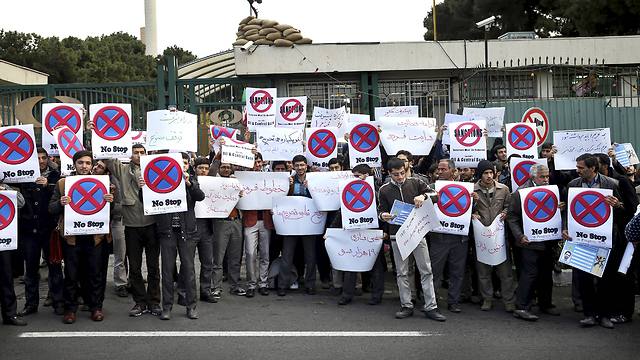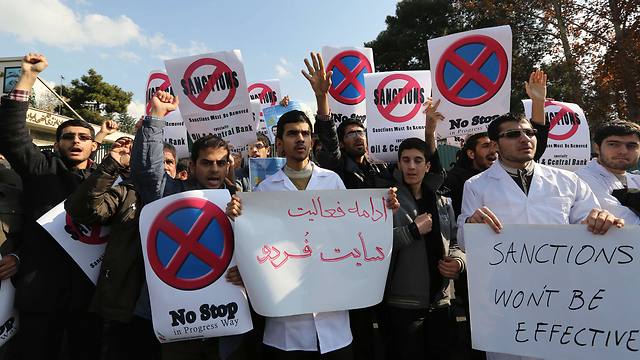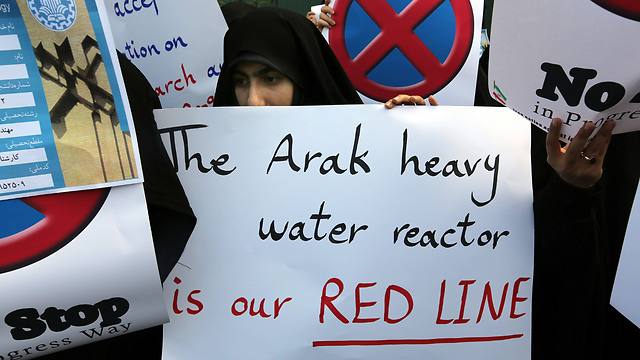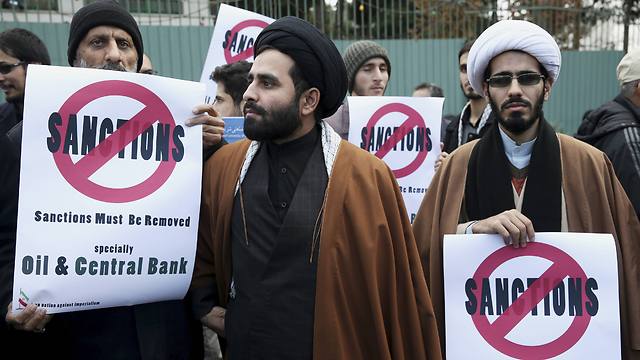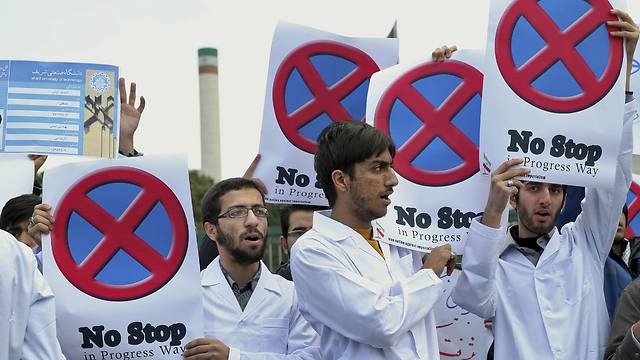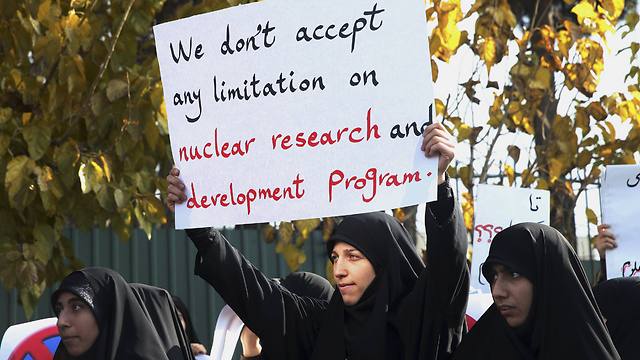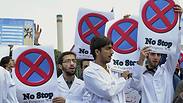
TEHRAN - Tensions over a possible nuclear deal between Iran and world powers were on display on Sunday outside an atomic facility in Tehran where a rare protest saw hardliners criticize government negotiators.
While the crowd was small - about 200, mostly students, gathered at the entrance to the Tehran Research Reactor - the event was the first such officially approved demonstration in months. It coincided with the penultimate day of talks in Vienna between Iran and the United States and other leading states about a permanent nuclear deal.
"Nuclear energy is our absolute right," and "Sanctions won't stop us," read placards held by protesters, many of them suggesting there should be no compromise on Iran's disputed atomic activities.
They chanted "Death to America" while a designated speaker rounded on the conduct of the year-long negotiations which entered their final 36 hours with a deal hanging in the balance. Iran's President Hassan Rouhani and Mohammad Javad Zarif, the foreign minister who is leading the talks in the Austrian capital, "do not know how to do diplomacy", the speaker said.
One woman held a banner that said: "The centrifuges are not working, nor is the economy," alluding to Rouhani's pledge to restart talks with the West to help Iran's sanctions-hit economy recover. One demonstrator, a medical student who did not want to give her name, said she was "pessimistic about the Americans involved in the negotiations."
"We want an agreement where if we give something we get something in return, and what we want is a total removal of sanctions," she said.
Despite the protest back home, an Iranian source in Vienna signalled openness to extending the talks by six months or even up to a year. Such an extension would be under terms of an interim deal reached in Geneva a year ago that traded a temporary freeze on some of Iran's nuclear activities for limited sanctions relief, the source said.
"We are still focused on agreeing to a kind of political" understanding which would not be written but which would allow for negotiators to fine-tune technical aspects of the agreement later, the source said.
An agreement of an extension?
With a deadline for a nuclear deal less than two days away, negotiators faced the choice Sunday of pushing on despite diminishing chance of agreement, or shifting to ways of extending negotiations past the target date.
A member of the Iranian delegation in Vienna said the tipping point could come Sunday night, with Iran and six world powers deciding that their differences are too big to bridge by Monday and switching to extension mode.
From that point on, he said, the negotiations would focus on reaching a "general political agreement" on what both sides are committed to resolving. The official said that talks would then be held in the near future to sign that agreement, leading to more negotiations on outstanding issues.
Another unnamed official was cited by Iran's official IRNA news agency as saying that discussion had already begun. But the US is unlikely to accept anything that stops at outlining issues to be solved without at least progress on narrowing the gaps.
Beyond assurances that the Iranians are not just talking for the sake of winning time, the US administration wants to show to congressional skeptics that there is sense to further negotiations.
Should such a plan be agreed upon, one possibility for a resumption of talks would be the first week in December when US Secretary of State John Kerry plans to return to Europe for a previously scheduled NATO foreign ministers meeting in Brussels, and an international conference in London.
Diplomats familiar with the negotiations said sizable gaps remain between the US and Iran on the key issue of how deeply Tehran would have to reduce nuclear activities that could be turned to making arms.
The talks are confidential, but President Barack Obama outlined the differences between Washington and Tehran in general terms.
"I think that our goal has consistently been to shut off a whole bunch of different avenues whereby Iran might get a nuclear weapon, and at the same time make sure that the structure of sanctions are rolled back step for step as Iran is doing what it's supposed to do," he told ABC's "This Week" in an interview aired Sunday.
"I think Iran would love to see the sanctions end immediately, and then to still have some avenues that might not be completely closed, and we can't do that."
As the clock ticks down, foreign ministers for most of the seven nations taking part in the Austria talks are converging in a concerted effort to get a deal.
Since his arrival Thursday, Kerry has met repeatedly with Iranian Foreign Minister Mohammad Javad Zarif and other key officials.
Germany's foreign minister landed Saturday, while Russian Foreign Minister Sergey Lavrov arrived Sunday afternoon. Counterparts from France and Britain were due to join them later in the day, and China's foreign minister was scheduled to arrive Monday.
Kerry also met with Saudi Foreign Minister Saud al-Faisal, whose country is vying for Middle East influence with Iran. Diplomats said Saud flew to Vienna from Paris solely for the briefing, planned to leave immediately afterward, and the two talked in his plane parked on the Vienna Airport tarmac.
The five permanent members of the UN Security Council - Britain, China, France, Russia and United States plus Germany - the so-called P5+1 - have been locked in talks with Iran since February to turn the interim Geneva accord into a lasting agreement. Such a deal is aimed at easing fears that Tehran could develop nuclear weapons under the guise of its civilian activities.
The Islamic republic denies it wants to build an atomic bomb and insists its nuclear program is entirely peaceful.














